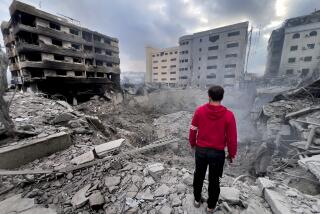10 Americans Tearfully Flee W. Beirut; Others Stay
BEIRUT — In a scene that captured both the chaos and pathos of this divided city, 10 tearful Americans were evacuated from Muslim West Beirut on Tuesday to the relative safety of the city’s Christian sector.
They left amid a frantic rush of speeding jeeps crammed with nervous Druze militiamen holding up pistols and submachine guns as they escorted the Americans to East Beirut. About 20 Americans remained in the Muslim sector.
Militiamen guarding the blocked-off and deserted former U.S. Consulate, where the evacuees gathered early Tuesday, could not conceal their astonishment at the sorrow of the departing Americans.
“They are all crying. It’s incredible. We’re trying to leave (Lebanon), and they want to stay,” said one grinning militiamen.
Riding in a gray bus with a security guard standing in the door, his weapon pointing skyward, and flanked by Lebanese police vans and carloads of Druze fighters, five men and five women--mostly English-language teachers at the American University of Beirut and its affiliated school, International College--left behind careers, lovers and friends.
Their stubborn attachment to survival in West Beirut was finally loosened by the murder of three Western colleagues in retaliation for the American air strike against Libya last week.
Martha Shaffner was shattered by the thought of leaving her Lebanese boyfriend and having to start over again. The warm climate, “wonderful friends” and her companion, known in the foreign community here as “Mike the Barber” for his ability to do crew cuts, had attracted Shaffner, of Troy, Ohio, to settle here years ago.
“I like it here. I have no future elsewhere. I have made this my home,” she said, sobbing. “But when I can’t walk on the streets anymore, then it’s time to leave. I have been sitting at home, being afraid. I am no longer free.”
One of the saddest evacuees was Thomas Weaver, who came here in 1947 to teach at a Lebanese high school called the International College. “I am very sad to leave,” Weaver said, adding that he hoped to be able to come back some day.
Something of an institution in the cultural life of West Beirut, Weaver, a tall bachelor with silvery-gray hair, has devoted his life to music and drama clubs he founded here.
“What are we going to do back there (in the United States)? We have nothing,” said Tabitha Petran, a writer from New York City and a West Beirut resident for the last 15 years.
Although U.S. Embassy officials refused to disclose details of the travel plans or whereabouts of the 10 Americans, some of them were put up at the homes of Americans residing in the Christian-controlled area until they could arrange passage to Cyprus and elsewhere.
Americans Born in Lebanon
A U.S. Embassy official said many of the Americans remaining “were born in Lebanon and (have) dual nationalities.”
“There are also those who refused to leave for various reasons. I cannot give you an exact number. We did our job. We advised them to leave, but we cannot force them to leave,” the official said.
Some of those staying are professors wishing to complete the term at the American University of Beirut.
“I am coordinating a program with 1,270 students. I now have nine out of 25 full-time teachers. The responsibilities are enormous. I will not set foot outside the campus for the next two months, but I just cannot leave right now,” said an American who stayed behind.
Philip Grant, a political science professor from Santa Barbara, Calif., expressed disappointment at not being able to complete the semester but noted that he could no longer invent rationales for staying after the assassination of three of his colleagues last week.
Grant said the two years he spent here allowed him to learn more about the United States and himself than he would have at home. But he added that he would like to study the Arab world somewhere else.
“Here all your energies go into living, as opposed to thinking,” he said.
Shaffner, although upset at having to leave Lebanon for reasons beyond her control, said she supported Reagan, “Yes, something has to be done with this man in Libya,” she said.
Western diplomats and relief-agency sources said the International Committee of the Red Cross had withdrawn all foreign staff members who are not Swiss.
The U.N. Relief and Works Agency, which administers relief and education for Palestinian refugees in Lebanon, has also pulled out Irish and Austrian administrators.
The dwindling number of Americans and Britons on the faculty of the university is seen as a setback to its 11-year struggle to remain above the strife here.
A university spokesman said English and American professors will replaced by Lebanese, but that accreditation and standards are likely to suffer.
Salim Hoss, Lebanon’s education minister, said the Lebanese had only themselves to blame for the evacuation of foreigners.
“We chased away businessmen, teachers, diplomats and foreign journalists. We had no mercy on anyone and in the end we had no mercy even on ourselves,” Hoss told reporters.
More to Read
Sign up for Essential California
The most important California stories and recommendations in your inbox every morning.
You may occasionally receive promotional content from the Los Angeles Times.










